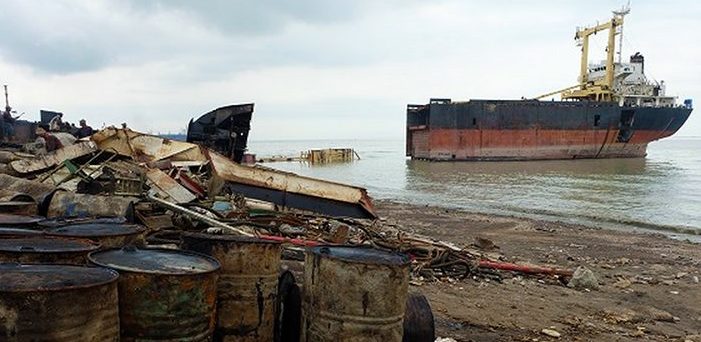BIMCO Launches Ship Recycling Alliance to Drive Safer and Greener Ship Disposal
In a move to enhance the safe and environmentally responsible dismantling of ships, BIMCO has introduced the Ship Recycling Alliance. The initiative aims to unite voices across the ship recycling and shipping industries to accelerate sustainable practices in the lead-up to the Hong Kong International Convention (HKC) taking effect in 2025.

The International Maritime Organization’s (IMO) Hong Kong International Convention for the Safe and Environmentally Sound Recycling of Ships (HKC) is set to come into force in June 2025, marking a new era in ship recycling practices. BIMCO’s newly launched Ship Recycling Alliance will be central in coordinating efforts to ensure compliance with these standards, particularly as the shipping industry faces a wave of vessel retirements in the coming decade.
The HKC is designed to promote sustainable ship recycling, focusing on preventing harm to workers and the environment. Over the next 10 years, 15,000 ships will be decommissioned and sent for dismantling. However, only a limited number of shipowners currently opt for HKC-compliant recycling, which makes promoting safe and environmentally sound disposal methods an urgent priority.
The Ship Recycling Alliance aims to address this gap by aligning ship recycling industry players with regulatory bodies and key stakeholders, providing a united front to advocate for compliant and responsible practices. BIMCO Secretary General and CEO David Loosley emphasized the significance of collective action, saying, “Part of the ship recycling industry is already trying to live up to the HKC standards ahead of its entry into force. To succeed in having our ships recycled responsibly and safely for people and the environment, we need all stakeholders to engage and step up the pace. The Ship Recycling Alliance will connect stakeholders, advise regulators, and create awareness among the public.”
A Unified Voice for Industry Standards
Currently, ship recycling is a complex process with standards varying greatly by region. Countries like India, Bangladesh, and Pakistan are major players in the global ship recycling market, but facilities in these countries differ in their compliance with international standards. The Ship Recycling Alliance intends to address these discrepancies by fostering a unified approach that respects both regional and global regulatory frameworks. The Alliance’s mandate includes providing advice to regulatory bodies, including the IMO, and liaising with the Secretariat of the Basel Convention (BC) to ensure legal clarity between overlapping regulations. One of the alliance’s primary goals will be to navigate the complexities that arise from interactions between HKC and Basel Convention standards, specifically regarding the management of waste from ship recycling processes.
According to Dr. Nikos Mikelis, a non-executive Director at GMS and the Alliance’s chairperson, this collaboration couldn’t come at a better time: “It is high time for an initiative like the Ship Recycling Alliance to be launched and put to work. We need an alliance that can formulate and represent the views of the international ship recycling industry and connect that with all other stakeholders involved. Doing so, we strongly believe we can move forward and fuel progress.” Dr Mikelis, a former IMO head specializing in Marine Pollution Prevention and Ship Recycling, underscores the need for a platform where diverse industry voices can collaborate and drive policy changes.
Founding Members and Scope of the Alliance
The Alliance is not only an initiative but also a coalition of founding members that bring extensive industry expertise. These members include BIMCO, the Bangladesh Ship Breakers and Recyclers Association (BSBRA), the Turkish Ship Recycling Industry Association (GEMISANDER), the Pakistan Ship Breakers and Recyclers Association (PSBRA), and the Ship Recycling Industries Association of India (SRIA). Additionally, prominent global players such as cash buyers GMS and Wirana, ship recycling services firm Guideship, and Indian ship recycling leader Bansal Group are also members. This diverse group of stakeholders from around the world provides the Alliance with a broad perspective and influence across the ship recycling industry.
As the HKC implementation date approaches, industry representatives believe the Alliance will serve as a conduit for facilitating best practices and advocating for stronger compliance standards. The Alliance will also focus on supporting compliant ship recycling facilities and cash buyers, as well as assisting financial institutions and shipowners interested in sustainable disposal solutions.
A Long Road Ahead for Ship Recycling Reform
Despite the progress represented by the HKC, the path to sustainable ship recycling is not without obstacles. Many shipowners, while aware of the forthcoming regulations, have yet to fully commit to compliant recycling practices. Voluntary HKC-compliant recycling remains a minority choice, a reality that the Ship Recycling Alliance seeks to address.
One of the key goals of the Alliance is to make the value of HKC compliance clearer to industry stakeholders, ensuring that both the environmental and economic benefits of responsible recycling are widely understood and promoted. For many of the main recycling states, aligning with HKC standards will also require infrastructure investments to modernize facilities. The Alliance aims to support these efforts by raising awareness and creating incentives for shipowners to choose compliant yards.
Moving Toward a Greener Future
As June 2025 approaches, the work of the Ship Recycling Alliance will be crucial in shaping the industry’s future and helping align global practices with HKC requirements. By bringing together key players from the shipping and recycling industries, the Alliance seeks to drive a shift toward sustainable ship disposal practices that prioritize environmental protection and worker safety.
With an estimated 15,000 ships set to be dismantled over the next decade, the Alliance’s work represents a significant step forward in global environmental policy for maritime operations. Through regulatory alignment, industry collaboration, and public awareness campaigns, the Alliance is poised to play an influential role in the adoption of greener, safer, and more responsible ship recycling practices.
As the industry prepares for the HKC’s enactment, BIMCO’s Ship Recycling Alliance stands as a testament to the power of unified action for a sustainable future.
Author: shipping inbox
shipping and maritime related web portal








